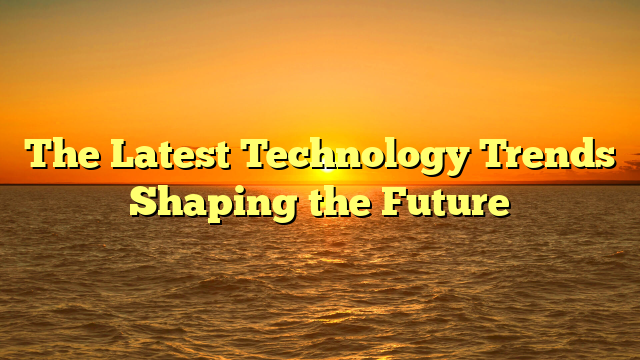Technology is evolving at an unprecedented pace, transforming how we live, work, and interact. From artificial intelligence to sustainable innovations, the latest trends are not only redefining industries but also reshaping everyday life. These developments bring Tempur99 both opportunities and challenges as society adapts to rapid digital transformation.
One of the most influential trends is artificial intelligence (AI). Once confined to research labs, AI now powers countless real-world applications. Businesses use AI to analyze massive datasets, optimize operations, and deliver personalized customer experiences. Generative AI tools, such as advanced chatbots and content creation systems, are revolutionizing creative industries by producing text, images, and even music with minimal human input. While AI offers efficiency and innovation, it also raises concerns about job displacement, ethics, and data privacy, making responsible use essential.
Closely connected to AI is the rise of the Internet of Things (IoT). Everyday objects—from smart home devices to connected cars—are now linked through the internet, creating vast networks of intelligent systems. In manufacturing and logistics, IoT enhances productivity by enabling real-time monitoring and predictive maintenance. Cities are also adopting IoT to improve traffic management, energy efficiency, and public safety, laying the foundation for smarter urban living. However, the more connected devices become, the more vulnerable they are to cyber threats, highlighting the need for stronger security measures.
Another crucial driver of digital innovation is 5G technology. With lightning-fast connectivity and lower latency, 5G enables new applications in augmented reality (AR), virtual reality (VR), autonomous vehicles, and remote healthcare. This advanced network infrastructure supports billions of connected devices, accelerating the development of smart cities and next-generation services. For consumers, 5G promises seamless digital experiences, but for governments and businesses, it presents the challenge of ensuring accessibility and affordability on a global scale.
Meanwhile, blockchain and Web3 technologies are redefining digital trust and decentralization. Originally popularized through cryptocurrencies, blockchain is now being applied across various sectors, from supply chain management to digital identity verification. Web3 envisions a decentralized internet where users regain control of their data and online interactions. Despite regulatory uncertainties, the potential of blockchain to increase transparency and security continues to attract significant investment and experimentation.
Sustainability has also become a central focus in technology. Green technology innovations, such as renewable energy solutions, eco-friendly manufacturing, and energy-efficient devices, are gaining momentum as the world confronts climate change. Major tech companies are investing in carbon-neutral operations and exploring advanced battery technologies to reduce environmental impact. These efforts highlight a growing recognition that future innovations must balance technological progress with ecological responsibility.
Lastly, quantum computing represents a groundbreaking frontier. Though still in its early stages, quantum computers have the potential to solve problems beyond the reach of traditional machines, particularly in pharmaceuticals, cryptography, and scientific research. While widespread adoption may take years, progress in this field signals a transformative shift in computational power.
In conclusion, the latest technology trends point toward a future that is more intelligent, interconnected, and sustainable. Yet, as innovation accelerates, society must address challenges related to security, ethics, and accessibility. The key will be finding a balance between harnessing the benefits of new technologies and managing their risks, ensuring that the digital future remains inclusive and beneficial for all.
